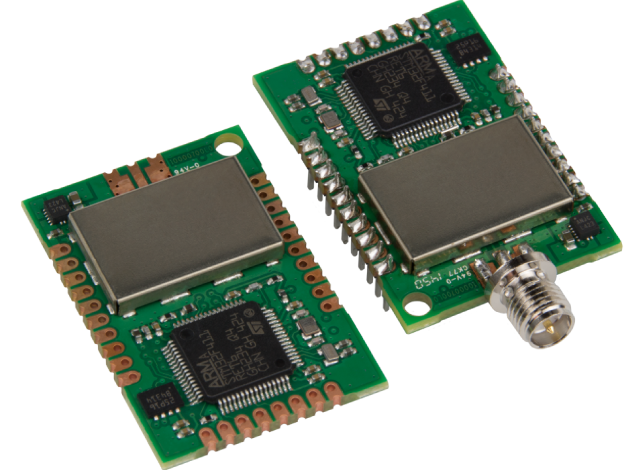A multifunctional and modular Firmware for Multitech's mDot based on ARM mBed provides a widerange of functionality for several Sensors such as MAX44009, BME280, MPU9250, SI1143 and uBlox. It allows you to quickly build a Sensornode that measures specific data with its sensors and sends it via LoRaWAN.
Dependencies: mDot_LoRa_Sensornode_Flowmeter_impl mbed-rtos mbed
LoRa-Sensornode Firmware for Multitech mDot
A multifunctional and modular Firmware for Multitech's mDot which provides a widerange of functionality for several Sensors. It allows you to quickly build a Sensornode that measures specific data with its sensors and sends it via LoRaWAN.


Supported Sensors
- MAX44009 (Lux Measurment) http://www.ebay.ie/itm/MAX44009-Ambient-Light-Sensor-Module-for-Arduino-with-4P-Pin-Header-/381676089124?hash=item58ddaaef24:g:-ecAAOSwzJ5XZm5E
- BME280 (Temperature, Pressure and Humdity Measurment) At the moment there are some known problem using this. https://www.adafruit.com/product/2652 https://www.amazon.com/Diymall-Pressure-Temperature-Sensor-Arduino/dp/B0118XCKTG
- MPU9250 (Acceleration, Gyroscope and Magnetometer) http://www.watterott.com/de/9-DOF-IMU-Module-With-MPU-9250
- Si1143 (Proximity up to 50cm) https://moderndevice.com/product/si1143-proximity-sensors/
- uBlox M8Q (GPS Position) http://www.dx.com/de/p/gygpsv3-m8n-u-blox-neo-m8n-001-flight-controller-gps-module-blue-394557#.V4lFW-uLRhE
Idea
The Firmware has some predefined Application Modes running different Tasks(Measurements). Each mode can be used in a different Scenario. Application_Modes define which sensors are used, how often they aquire data and how often the data has to be sent via LoRa. Lets say you just want to measure the Light then you choose an Application_Mode (or define one) that only runs TaskLight for light measurement. As a standard all measurements are taken every second and sent via LoRa but you can change that interval depending on your usage Scenario
app/MPU9250.cpp
- Committer:
- mitea1
- Date:
- 2018-11-02
- Revision:
- 10:4051c38bf73f
- Parent:
- 0:f2815503561f
File content as of revision 10:4051c38bf73f:
/*
* MPU9250.cpp
*
* Created on: 19.05.2016
* Author: Adrian
*/
#include "MPU9250.h"
MPU9250::MPU9250(I2C_RT* i2c){
setI2c(i2c);
this->config = new MPU9250Config();
}
MPU9250::~MPU9250() {
// TODO Auto-generated destructor stub
}
void MPU9250::setI2c(I2C_RT* i2c){
this->i2c = i2c;
}
void MPU9250::init(MPU9250_MODE desiredMode){
config->build(desiredMode);
enableAxisAccelerationMeasurement();
enableAxisGyroscopeMeasurement();
enableAxisTeslaMeasurement();
configureInterrupts();
setWakeOnReceiveThreshold();
}
float MPU9250::getXAxisAcceleration(){
uint8_t xAccelarationHighByte;
uint8_t xAccelarationLowByte;
i2c->read_RT(MPU9250_DEFAULT_ADDRESS,MPU9250_ACCEL_XOUT_H,false,
&xAccelarationHighByte,1);
i2c->read_RT(MPU9250_DEFAULT_ADDRESS,MPU9250_ACCEL_XOUT_L,false,
&xAccelarationLowByte,1);
int16_t acceleration = ((int16_t)xAccelarationHighByte<<8)|((int16_t)xAccelarationLowByte);
return ((float) acceleration)/config->getAccelerationDivider();
}
float MPU9250::getYAxisAcceleration(){
uint8_t yAccelarationHighByte;
uint8_t yAccelarationLowByte;
i2c->read_RT(MPU9250_DEFAULT_ADDRESS,MPU9250_ACCEL_YOUT_H,false,
&yAccelarationHighByte,1);
i2c->read_RT(MPU9250_DEFAULT_ADDRESS,MPU9250_ACCEL_YOUT_L,false,
&yAccelarationLowByte,1);
int16_t acceleration = yAccelarationHighByte<<8|yAccelarationLowByte;
return ((float) acceleration)/config->getAccelerationDivider();
}
float MPU9250::getZAxisAcceleration(){
uint8_t zAccelarationHighByte;
uint8_t zAccelarationLowByte;
i2c->read_RT(MPU9250_DEFAULT_ADDRESS,MPU9250_ACCEL_ZOUT_H,false,
&zAccelarationHighByte,1);
i2c->read_RT(MPU9250_DEFAULT_ADDRESS,MPU9250_ACCEL_ZOUT_L,false,
&zAccelarationLowByte,1);
int16_t acceleration = zAccelarationHighByte<<8|zAccelarationLowByte;
return ((float) acceleration)/config->getAccelerationDivider();
}
float MPU9250::getXAxisGyro(){
uint8_t xGyroscopeHighByte;
uint8_t xGyroscopeLowByte;
i2c->read_RT(MPU9250_DEFAULT_ADDRESS,MPU9250_GYRO_XOUT_H,false,
&xGyroscopeHighByte,1);
i2c->read_RT(MPU9250_DEFAULT_ADDRESS,MPU9250_GYRO_XOUT_L,false,
&xGyroscopeLowByte,1);
int16_t gyroscope = xGyroscopeHighByte<<8|xGyroscopeLowByte;
return ((float) gyroscope)/config->getGyroDivider();
}
float MPU9250::getYAxisGyro(){
uint8_t yGyroscopeHighByte;
uint8_t yGyroscopeLowByte;
i2c->read_RT(MPU9250_DEFAULT_ADDRESS,MPU9250_GYRO_YOUT_H,false,
&yGyroscopeHighByte,1);
i2c->read_RT(MPU9250_DEFAULT_ADDRESS,MPU9250_GYRO_YOUT_L,false,
&yGyroscopeLowByte,1);
int16_t gyroscope = yGyroscopeHighByte<<8|yGyroscopeLowByte;
return ((float) gyroscope)/config->getGyroDivider();
}
float MPU9250::getZAxisGyro(){
uint8_t zGyroscopeHighByte;
uint8_t zGyroscopeLowByte;
i2c->read_RT(MPU9250_DEFAULT_ADDRESS,MPU9250_GYRO_ZOUT_H,0,
&zGyroscopeHighByte,1);
i2c->read_RT(MPU9250_DEFAULT_ADDRESS,MPU9250_GYRO_ZOUT_L,0,
&zGyroscopeLowByte,1);
int16_t gyroscope = zGyroscopeHighByte<<8|zGyroscopeLowByte;
return ((float) gyroscope)/config->getGyroDivider();
}
float MPU9250::getXAxisTesla(){
uint8_t xTelsaHighByte;
uint8_t xTelsaLowByte;
i2c->read_RT(MPU9250_MAG_ADDRESS,MPU9250_MAG_XOUT_H,false,
&xTelsaHighByte,1);
i2c->read_RT(MPU9250_MAG_ADDRESS,MPU9250_MAG_XOUT_L,false,
&xTelsaLowByte,1);
uint8_t status;
i2c->read_RT(MPU9250_MAG_ADDRESS,MPU9250_MAG_ST2,false,
&status,1);
int16_t tesla = xTelsaHighByte<<8|xTelsaLowByte;
return (float) (tesla) / config->getTeslaDivider();
}
float MPU9250::getYAxisTesla(){
uint8_t yTelsaHighByte;
uint8_t yTelsaLowByte;
i2c->read_RT(MPU9250_MAG_ADDRESS,MPU9250_MAG_YOUT_H,false,
&yTelsaHighByte,1);
i2c->read_RT(MPU9250_MAG_ADDRESS,MPU9250_MAG_YOUT_L,false,
&yTelsaLowByte,1);
uint8_t status;
i2c->read_RT(MPU9250_MAG_ADDRESS,MPU9250_MAG_ST2,false,
&status,1);
int16_t tesla = yTelsaHighByte<<8|yTelsaLowByte;
return (float) (tesla) / config->getTeslaDivider();
}
float MPU9250::getZAxisTesla(){
uint8_t zTelsaHighByte;
uint8_t zTelsaLowByte;
i2c->read_RT(MPU9250_MAG_ADDRESS,MPU9250_MAG_ZOUT_H,false,
&zTelsaHighByte,1);
i2c->read_RT(MPU9250_MAG_ADDRESS,MPU9250_MAG_ZOUT_L,false,
&zTelsaLowByte,1);
uint8_t status;
i2c->read_RT(MPU9250_MAG_ADDRESS,MPU9250_MAG_ST2,false,
&status,1);
int16_t tesla = zTelsaHighByte<<8|zTelsaLowByte;
return (float) (tesla) / config->getTeslaDivider();
}
void MPU9250::enableAxisAccelerationMeasurement(){
uint8_t configValueAcceleration=config->getAccelerometerScale()<<3;
i2c->write_RT(MPU9250_DEFAULT_ADDRESS,MPU9250_ACCEL_CONFIG,false,
&configValueAcceleration,1);
}
void MPU9250::enableAxisGyroscopeMeasurement(){
uint8_t configValueGyroscope = config->getGyroscopeScale()<<3;
i2c->write_RT(MPU9250_DEFAULT_ADDRESS,MPU9250_GYRO_CONFIG,false,
&configValueGyroscope,1);
}
void MPU9250::enableAxisTeslaMeasurement(){
uint8_t configValueMagnetometer = 0x02;
i2c->write_RT(MPU9250_DEFAULT_ADDRESS,MPU9250_INT_PIN_CFG,false,
&configValueMagnetometer,1);
configValueMagnetometer = 0;
i2c->write_RT(MPU9250_DEFAULT_ADDRESS,MPU9250_USER_CTRL,false,
&configValueMagnetometer,1);
configValueMagnetometer = 0;
i2c->write_RT(MPU9250_MAG_ADDRESS,MPU9250_MAG_CNTL1,false,
&configValueMagnetometer,1);
configValueMagnetometer = config->getMagnetometerBitResolution()<<4|
config->getMagnetometerMeasureMode();
i2c->write_RT(MPU9250_MAG_ADDRESS,MPU9250_MAG_CNTL1,false,
&configValueMagnetometer,1);
}
void MPU9250::configureInterrupts(){
uint8_t configValueInterruptPin = config->getInterruptPinConfiguration()|0x02;
i2c->write_RT(MPU9250_DEFAULT_ADDRESS,MPU9250_INT_PIN_CFG,false,
&configValueInterruptPin,1);
uint8_t configValueInterruptEnable = config->getInterruptEnableConfiguration();
i2c->write_RT(MPU9250_DEFAULT_ADDRESS,MPU9250_INT_ENABLE,false,
&configValueInterruptEnable,1);
}
void MPU9250::setWakeOnReceiveThreshold(){
uint8_t wakeOnReceiveThreshold = config->getWakeOnMotionThreshold();
i2c->write_RT(MPU9250_DEFAULT_ADDRESS,MPU9250_WOM_THR,false,
&wakeOnReceiveThreshold,1);
}